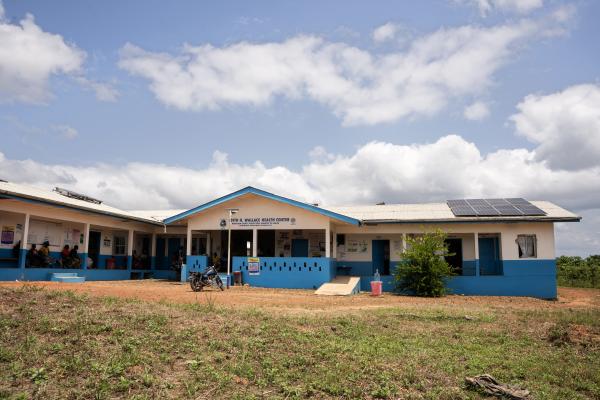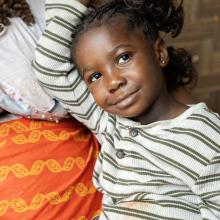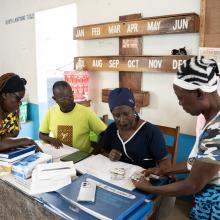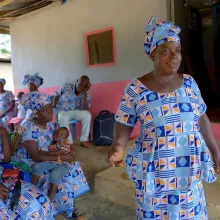To provide effective patient care, safe and well-equipped spaces with access to electricity and clean water are not only essential, but they are also considered as the “nonnegotiable necessities” by Partners In Health (PIH). While some facilities may already exist, many require extensive renovations or need to be built from the ground up.
In Maryland County, Southeast Liberia, PIH has worked closely with the County Health Team (CHT) to transform health care infrastructure. Nearly every aspect of the facilities supported by PIH has been rebuilt or refurbished, including comprehensive upgrades to electrical systems, water, sanitation, and hygiene (WASH) infrastructure. These efforts ensure 24/7 electricity and clean water, which PIH considers as critical to health care as surgery, maternal health, and child health.
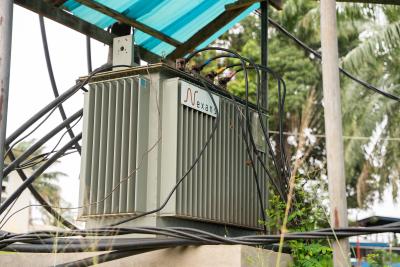
A 250 KVA transformer procured and installed to supply electricity to J.J Dossen hospital in Harper, Maryland County, Liberia. Photo by Ansumana O. Sesay / PIH
In 2023 and 2024, PIH made significant progress in addressing electricity and WASH challenges at its supported facilities, including J.J. Dossen Hospital (JJD), Pleebo Health Center (PHC), Boniken Clinic, and Edith Wallace Health Center (EWHC), through its Space and Stuff (SNS) Grant. Upgrades included installing 3-phase wiring, connecting facilities to the Liberia Electricity Corporation’s public grid, and providing three generators (250 KVA, 100 KVA, and 100 KVA) alongside two automatic voltage regulators (AVRs) for primary and backup power sources. Additionally, a 25 KVA generator powers the Edith Wallace Health Center, while four boreholes were constructed to ensure a reliable water supply. Toilets were reopened, water and sewage pipes were replaced, and issues like overflow and backflow were resolved to enhance hygiene and water flow. These interventions followed thorough assessments of electrical components, including utility transformers, power generation, distribution, grounding, and safety measures.
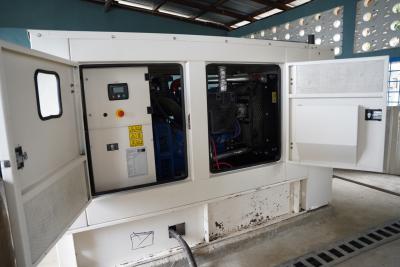
One of 100 KVA generators for back up electricity at Pleebo Health Center. Photo by Ansumana O. Sesay
Only 33% of Liberia’s population has access to electricity, with access in regions like Maryland County remaining extremely low. According to the African Development Bank’s Liberia Energy Fact Sheet, the country’s power plants have a total capacity of only 126 megawatts. Given the limitations of the public electricity grid, the reliance on generators remains both significant and costly. Between June 2024 and May 2025, PIH-supported facilities consumed over 23,172 gallons of fuel, an average of 1,931 gallons per month across J.J. Dossen Hospital, Pleebo Health Center, and Edith Wallace Health Center. J.J. Dossen Hospital alone consumed 9,540 gallons annually, while Pleebo Health Center required 6,480 gallons. Despite these challenges, the enhanced electrical capacity has ensured uninterrupted health care delivery, enabling lifesaving procedures to continue without disruption, reducing fire risks from corroded wiring, and lowering patient mortality rates.
Before PIH collaborated with the County Health Team, electricity was a major obstacle to delivering health services at J.J. Dossen Memorial Hospital in Harper City and other facilities. The hospital relied on a 30 KVA generator that consumed nearly 45 gallons of fuel daily, an unsustainable cost given its limited government budget and competing priorities. This is why the hospital’s administer describes the provision of stable and reliable electricity as great achievement.
“You see, the provision of drugs in the hospital, we now have electricity, running water in the hospital; these are great achievements that I can share since PIH started working with us,” says Julia Natt Doe, administrator, JJ Dossen Hospital.
In 2017, the hospital’s generator typically ran for about four hours during the day and was turned back on at night as noted by Dr. Methodius George, former Maryland County Health Officer, shared in an interview with The New Dawn, a local Liberian newspaper. It operated longer only during emergencies requiring electricity, such as cesarean sections. At the time, the hospital was in slightly better condition compared to its state after Liberia’s civil war, during which it had been looted and left in disrepair.
Despite PIH’s commitment to reliable electricity, securing stable power remains a persistent challenge in many health centers, and clinics, where PIH operates due to years of disinvestment in local health systems weakened by war, epidemics, and inequitable global policies.
Over the past decade, the partnership between PIH and the Maryland County Health Team has transformed a once-neglected health care system into a beacon of hope. J.J. Dossen Hospital and other facilities have become preferred destinations for care, saving lives and upholding the dignity of people in the region, as well as residents of neighboring Ivory Coast. Partners In Health Liberia remains steadfast in its commitment to working alongside the Ministry of Health, the Government of Liberia, and local communities to establish meaningful partnerships and build healthcare systems that improve access, utilization, and quality for all.
